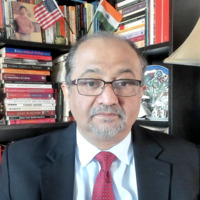
Kenneth Surin
Related Authors
Johannes Zachhuber
University of Oxford
Noel B. Salazar
KU Leuven
Muqtedar Khan
University of Delaware
James Elkins
School of the Art Institute of Chicago
Brian Leiter
University of Chicago
Richard Bellamy
University College London
Cristiana Facchini
Università di Bologna
Stephen R Palmquist
Independent Researcher
Remo Caponi
University of Cologne
Nina Glick Schiller
The University of Manchester
InterestsView All (24)










Uploads
Books by Kenneth Surin
Surin begins by examining the current regime of accumulation--the global domination of financial markets over traditional industrial economies--which is used as an instrument for the subordination and dependency of poorer nations. He then moves to the constitution of subjectivity, or the way humans are produced as social beings, which he casts as the key arena in which struggles against dispossession occur. Surin critically engages with the major philosophical positions that have been suggested as models of liberation, including Derrida's notion of reciprocity between a subject and its other, a reinvigorated militancy in political reorientation based on Badiou and Zizek, the nomad politics of Deleuze and Guttari, and the politics of the multitude suggested by Hardt and Negri. Finally, Surin specifies the material conditions needed for liberation from the economic, political, and social failures of our current system. Seeking to illuminate a route to a better life for the world's poorer populations, Surin investigates the philosophical possibilities for a Marxist or neo-Marxist concept of liberation.
Papers by Kenneth Surin
Surin begins by examining the current regime of accumulation--the global domination of financial markets over traditional industrial economies--which is used as an instrument for the subordination and dependency of poorer nations. He then moves to the constitution of subjectivity, or the way humans are produced as social beings, which he casts as the key arena in which struggles against dispossession occur. Surin critically engages with the major philosophical positions that have been suggested as models of liberation, including Derrida's notion of reciprocity between a subject and its other, a reinvigorated militancy in political reorientation based on Badiou and Zizek, the nomad politics of Deleuze and Guttari, and the politics of the multitude suggested by Hardt and Negri. Finally, Surin specifies the material conditions needed for liberation from the economic, political, and social failures of our current system. Seeking to illuminate a route to a better life for the world's poorer populations, Surin investigates the philosophical possibilities for a Marxist or neo-Marxist concept of liberation.